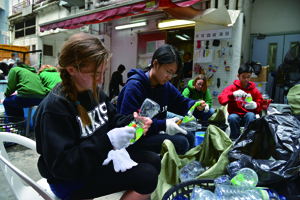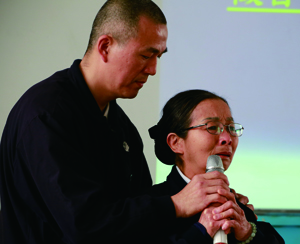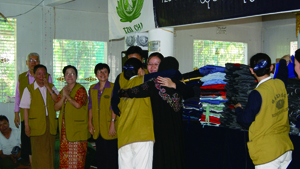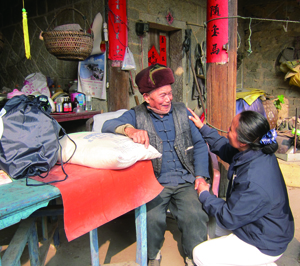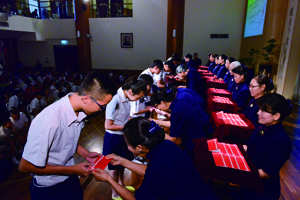

| Tzu Chi Events Around the World | ||||||||||
Hong Kong Volunteer Alice Choo (朱曉眉) often goes to the Hong Kong International School (HKIS) to share Tzu Chi environmental protection ideals with students and teachers. As a result, students, teachers, and even parents at the HKIS volunteer almost every Saturday at the Tzu Chi recycling station in Quarry Bay. On January 10, 2014, over 30 students and teachers went to the station to experience recycling. The group was from HKIS and two of its sister schools, Concordia International School Hanoi (CISH) and Concordia International School Shanghai (CISS). “This is the first time that I’ve done recycling. I’m surprised to see the large amount of things here that need to be separated by type,” said student Jenny Seol, from Korea, after she had handled some recyclables herself. “I never knew that different types of plastics were identified by different numbers. I’ve learned a lot here. Recycling is something new and valuable to me.”
While enjoying some cakes the volunteers had made, the visitors listened to Choo share her experiences in helping victims of Typhoon Haiyan in the Philippines. She informed the group that the blankets Tzu Chi distributed to survivors were made from recycled plastic bottles. They all touched and felt a blanket made from plastic bottles and were awed to learn that garbage could be transformed into resources such as soft blankets to help those in need. Patrick Freking of CISH said that they came to the station hoping to show the students something positive, to help them see what they can do to make the world a better place, and how to go about doing it. “We don’t recycle in Vietnam,” he said. “We just put things that we think are useless into garbage cans.” After visiting the station, he realized better that recycling can help reduce the consumption of resources and keep the environment cleaner. Bob Bieniek of CISS thought that separating numbers 1 and 2 plastic bottles was quite easy and that students could do that at home. He was considering taking the recycling ideas he had learned at the station back to students in Shanghai. Many students also said that they would start recycling in their own homes. Seeing everyone leaving the station with smiles on their faces, volunteers hoped that they had sown seeds of environmental protection in the minds of the visitors.
Taiwan On February 18, Tzu Chi volunteers Gao Wei-ying (高惟碤), Huang Qing-tang (黃慶堂), and Wu Zhi-qing (吳志慶) entered Hualien Prison Affiliated Zheng-de High School to share their stories with some students there. All three had had brushes with the law and had spent time behind bars for their transgressions. They were accompanied by nine other Tzu Chi volunteers. After passing through 12 iron gates, the volunteers arrived in the classroom and met the confined students. Gao told the students that they should be their own guardian angels and rise up from wherever they had fallen. When Gao was little, he was often bullied by his schoolmates because he was shy and could not keep up with his studies. One day he vowed to become the meanest, toughest gang boss ever so nobody would pick on him again. After making that vow, he started skipping school, stealing things, and causing trouble. His behavior only worsened when he entered junior high school. “Other students put books in their school bags; I put liquor and weapons in mine,” he said. He left home after graduation and soon became a gangster. In 1989, Gao was sentenced to nine years in jail for committing armed robbery. While he was doing time, an inmate gave him a Buddhist sutra. This gift started Gao on his Buddhist journey. The inmate also introduced Tzu Chi to him. Gao became a regular donor to Tzu Chi and started reading Tzu Chi Monthly and listening to Tzu Chi radio programs. Exposure to Tzu Chi helped him realize that he should no longer put off practicing filial piety and doing good deeds. He knew that he had to stop breaking his mother’s heart. Not long after this decision, he started washing clothes for other inmates to make money. The money he earned, he sent to his mother. He also introduced Tzu Chi to other inmates and tried to raise money from them for the charity. Gao was released on parole in 1994. He has been volunteering for Tzu Chi ever since, engaged in work such as recycling. Visiting the prison high school to share Tzu Chi stories and Master Cheng Yen’s words of wisdom with students has also been part of his work with the foundation. He has received a very positive response for his visits. Gao’s mother, a Tzu Chi volunteer herself, was in the group that accompanied him on this day to the high school. Mrs. Gao, 73 years old, sang a song she had written describing her sadness while waiting for her son to be released from prison. The song brought tears to many students.
Wu Zhi-qing said that he had been in and out of prison many times when he was young. Once a Tzu Chi volunteer said to them in jail, “Tomorrow or the next life—which will come first, we never know.” The volunteer said those words to remind the inmates of life’s impermanence and of the need to seize time to do good. That was like a wake-up call for Wu. He made up his mind to transform himself, and he did it. “Gao Wei-ying has done it, I’ve done it, and you can do it too.” Wu encouraged the students to transform themselves as he and Gao had done. Huang Qing-tang had been incarcerated when he was young for stabbing his brother-in-law. He too advised the students to grow in wisdom, study hard in school, and pay back to society when they got out. Liu, a student, said that he had applied for parole and that he hoped he could be back with his parents soon. He promised he would clean up his act, give to others, and be a good son. Yang, another student inmate, was scheduled to be released in July 2015. The song that Gao’s mother had sung reminded him of his own mother and made him weep. “I thank Master Cheng Yen for creating Tzu Chi and allowing us to be exposed to good influences here in prison. I’ll help others [when I’m out] and help make our society more harmonious.” Gao, Wu, and Huang reminded the students that to err is human and that what is important is to learn from their mistakes. “We at Tzu Chi will wait for you to join us.” Myanmar On December 30, 2013, a fire broke out in the village of Katbat, Laputta, Ayeyarwady Region, leaving over 1,100 people homeless. Most of the homeless victims took shelter at a Buddhist monastery; some went to stay with relatives or friends or simply camped by the road. When Tzu Chi volunteers heard about their plight, they started raising money to provide relief. Volunteer Kyaw Khin (林銘慶) helped transport the relief goods to a wharf to be shipped by boat to the village. Twelve volunteers set out for the disaster area from Yangon around noon on January 1, 2014. After traveling 252 kilometers (156 miles), they arrived at Laputta at 8:00 that evening. The next morning, they took a three-hour boat ride to arrive at their final destination. As their boat drew close to the village, they saw that the riverside area had been badly charred. Trees and plants were blackened, and buildings were burnt down to the bare walls. More than 200 homes and businesses were reported to have been destroyed by the fire. The fire was the second of two recent disasters for many of the victims. Cyclone Nargis had devastated the area five years before. It had not been easy for the villagers to rebuild after the cyclone, and now this fire destroyed many buildings again. Seeing their houses or shops brought down by the fire truly broke the hearts of many victims. Win Win Maw, one of the victims, said she had finally paid back all the debt she had incurred to recover after Cyclone Nargis, only to have the fire take away all she had again. Her store and home were both destroyed by the fire. She was in despair about what to do next. She said, “Cyclone Nargis spared my store, so I just fixed it up and reopened it for business. But now even my store is gone.” The volunteers went to the monastery to distribute blankets, bowls, clothes, and sleeping mats to fire victims. They also distributed emergency cash, ranging from 30,000 to 50,000 Burmese kyat (US$30 to $50), depending on the size of a household. Volunteer Thi Ta Khin (李金蘭) introduced Tzu Chi to the victims and shared with them what the foundation had done in Myanmar. She also read a letter from Master Cheng Yen. Many victims were moved to tears during the volunteers’ sign-language performance of the Tzu Chi song, “One Family.” Victim Hla Shwe said that in his 50 years, he had never seen a charity group like Tzu Chi. “Tzu Chi volunteers have been doing things that benefit mankind. They help us, even though we’re strangers to them. I’ve learned from them that I should help others like they do.” Many victims were inspired to take out some money and put it in donation boxes when they learned that Tzu Chi had started its charity work with 30 housewives each saving 50 NT cents (US$0.02) in bamboo coin banks every day. Volunteers also told the gathering that the blankets distributed to them had been made from plastic bottles. They pointed out that everything in the distribution had been made possible by the love of Tzu Chi volunteers around the world. Volunteers bowed respectfully and presented emergency cash and supplies to the survivors. They rounded out their gifts with hugs to help cheer the victims up on their road to recovery.
China Tzu Chi held annual winter aid distributions from December 27 to 31, 2013, in Fujian Province. Areas covered included Quanzhou, Zhangzhou, and Xiamen. On the first day, 7,371 families received rice, cooking oil, and other daily necessities in eight locations around Quangang District in Quanzhou. Through the distribution of aid, volunteers hoped to bring warmth to the needy in the cold of winter.
On the first day, in Nanpu, one of the distribution venues, volunteer Cai Lizhen (蔡麗珍) said that this was the third year Tzu Chi had distributed aid in that town. Because no Tzu Chi volunteers lived there, most helpers had traveled on two chartered buses from neighboring Huian, 30 minutes away. There were also volunteers who had come all the way from Taiwan to help out. Cai was grateful to all the volunteers as well as local government officials for helping make the event possible. A total of 1,352 people from 1,036 families in Nanpu benefited from the distribution. Dharma Master Dao Shen (道深) was one of the volunteers. He had heard about Master Cheng Yen before he became a Buddhist monk, and he greatly identifies with her ideal of humanized Buddhism. “Especially the part about love and care for society,” he said. “I hope to emulate the Master’s spirit of ‘great compassion for all.’” He worked alongside other volunteers, moving relief supplies, putting goods in order, and helping recipients get their supplies. The Quangang Family Volunteer Association is a local group with over 200 members. People from the association have taken part in the event for three consecutive years. More than 20 of them came and helped out this year. One of them said cheerfully, “When it comes to doing good, we should all pitch in.” Wang Shuqing (汪淑卿), a 29-year-old mother, took leave from her company this day to volunteer at the event. She had come to know Tzu Chi through her cousin Wang Jiankui (汪建奎), who began receiving help from the foundation after falling victim to cancer. He later became a certified Tzu Chi volunteer. Sadly, he succumbed to the illness and passed away at the beginning of 2013. Touched by the care that volunteers extended to her cousin, Shuqing herself joined the foundation to serve. Volunteer Xu Dongmei (許冬梅) had been extremely busy for half a year because members of her family had fallen ill one after another. She had not slept well since her father was hospitalized six days before. Despite her stressful family situation, she came to the distribution to help document it. This was the first time Zhuang Bizhu (莊碧珠), 75, volunteered at a Tzu Chi distribution. She had come at the invitation of a friend. It was quite an impressive sight to see her carrying an 18-kilogram (40-pound) bag of rice on her shoulders. She said she was thrilled to offer her services. In the afternoon, volunteers split into teams to deliver relief supplies to the homes of people who were either too advanced in age to come personally, or who had restricted mobility. Zhang Rongmei (張榮妹) had been bedridden for years due to illness. Her son had died, but a daughter looked after her. Volunteers presented supplies to the old woman and offered her their best wishes. They wished her a speedy recovery. Next they went to an old house where 95-year-old Qiu Renjin (邱仁金) lived alone. Despite his advanced age, Qiu could still take care of himself; he was only slightly hard of hearing. “You brought along so much stuff,” he said in high spirits to the visiting volunteers when he saw them putting rice and other items on a table. The volunteers’ visit brought cheer to the otherwise quiet house.
Singapore In February 2009, Tzu Chi Singapore initiated a large-scale program called “Seeds of Hope” to help students affected by the economic downturn. The program, which provides meals and transportation subsidies to such students, entered its fifth year in 2013. On December 21 and 22, 2013, students who were to receive the financial aid in 2014 attended four presentation ceremonies held at Jing Si Hall and River Valley High School. In all, 1,654 students from 20 primary schools and 62 secondary schools attended the ceremonies.
Concord Primary School Vice-Principal Wang Tai Wee (王大偉) took the stage and shared his story with the students. He told them that he came from a family where his father was the sole breadwinner. To save money, Wang and his three siblings used the same textbooks year after year, the older children passing them down to the younger ones. He was thus able to sympathize with students from families with limited means. He encouraged the students not to give up on their goals and to pay back to society after they become successful. Hu Zhiwei (胡智偉), a secondary school student, is a beneficiary of the program. He said that he loves art and wants to be a teacher. Though his family is impoverished, he has never thought of giving up his dream. “When you have a dream, you feel hopeful and your life is full of purpose.” Hu’s parents don’t earn much money. The financial aid from the program—around US$800 a year—helps take some of the pressure off them. Hu expressed gratitude to Tzu Chi for its help and said he liked the Jing Si aphorisms printed on the backs of the lunch vouchers. They showed him a good way to conduct himself and deal with people and events. Twelve-year-old Nurul Izzaty attended one of the ceremonies with her nine-year-old sister, Adawiyah, and their mother, Masarina. Their father can only do odd jobs because of his poor health, so Masarina has to help support the family. However, she suffers from asthma, so she can’t over-exert herself. Fortunately, her two daughters are thoughtful and understanding. After finishing their homework, they do housework to make things easier on their mother. Nurul said that she was grateful to her mother for everything she does for them. “I’ll study hard and get a good job in the future so that I can help improve my family’s life.” Many students brought coin banks to the ceremonies and donated them to the foundation. “We want to thank Tzu Chi by giving to the needy,” said Liang Junpei (梁峻培) and Liang Junhao (梁峻豪), two brothers who are both in primary school. A total of 372 Tzu Chi volunteers helped make the ceremonies possible. Volunteers Lin Cuilian (林翠蓮) and Chen Zhaoyun (陳昭云) thanked the principals, teachers, and staff for their help and support for the program. They also thanked the parents for trusting Tzu Chi and allowing volunteers’ home visits to go smoothly. |
















|

